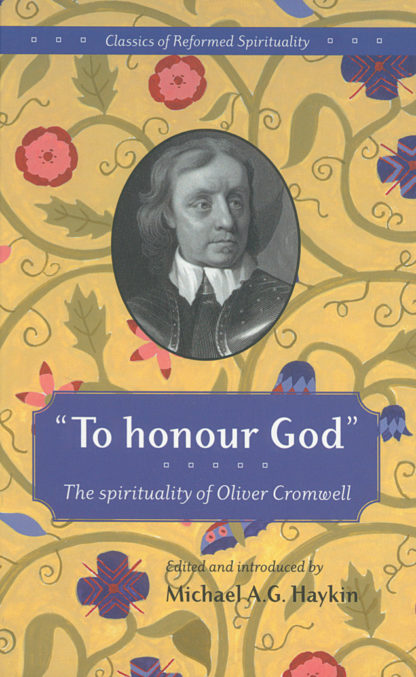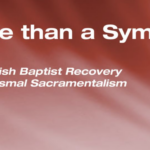The life of Oliver Cromwell is fascinating. From his role in the 17th century English civil war, to his appointment as “Lord Protector” (head of state) of England Ireland and Scotland in 1653, a position he held until he died in 1658, his life is thoroughly interesting for the history-inclined person. But alongside this, Cromwell is deeply instructive for Christian spirituality (how to live the Christian life).
“To Honour God” The Spirituality of Oliver Cromwell is a collection of letters and extracts from Cromwell with an introduction written by historian Michael Haykin. The book is part of the Classics of Reformed Spirituality series by H & E Publishing. These letters reveal the core of Cromwell’s spirituality, which Haykin notes, is founded on three pillars: Providence, Conversion, and Christian Unity. These are not unique to Cromwell, or to his time, but are hallmarks of Biblical spirituality and therefore useful for us today.
Providence
That a sovereign, just and merciful God governed all things by his wise providence was crucial for Cromwell. Sometimes he goes too far and, in my opinion, overestimates his ability to discern God’s purposes behind certain events. But most of the time his providential spirituality is soaked with a humble confidence and a sweet comfort in God’s goodness and mercy. For example, when writing to inform William Lenthall that his son died in battle, Cromwell says,

To Honour God: The Spirituality of Oliver Cromwell
Michael Haykin
Editor Michael Haykin provides an introduction and brief study of Cromwell’s spirituality through a consideration of his view of divine providence, conversion and activism. A chronology of the life of Cromwell is followed by 30 selections from his letters, speeches, sayings and prayers. These selections are footnoted with interesting historical detail and include biblical references.
God hath taken away your eldest son by a cannon-shot … the Lord took him into the happiness we all pant after and live for. There is your precious child full of glory, to know sin nor sorrow anymore … Let this drink up your sorrow; seeing these are not feigned words to comfort you, but the thing is so real and undoubted a truth (pp. 51-52).
Here is confidence, comfort and peace stabilized by the absolute sovereignty of God.
Another way God’s providence shaped Cromwell’s spirituality was his view of history. History is not neutral or indifferent, but rather the scene of God’s work. Therefore, one either allies with the Lord or opposes him. At the same time, our work is given by God. In a letter asking his brother for prayer, Cromwell says, “I have not sought these things; truly I have been called unto them by the Lord, and therefore am not without some assurance that he will enable his poor worm and weak servant to do his will and fulfil my generation” (p 79). His vocation was not a pastoral position, but it was still a calling from God, and therefore he trusts that God will supply all he needs to fulfill this work.
Cromwell’s letters can help us treasure that our lives are not collections of random events but guided by the wise hand of God.
Conversion
Cromwell’s experience and theology of conversion are key to his understanding of the Christian life. Together they affirmed the goodness of God’s wise sovereignty and his eternal rest in Christ. Haykin says, “The sovereignty of God in salvation thus becomes the sinner’s place of rest, not only at conversion, but for the rest of his or her life” (p. 27).
In a letter to Sir Thomas Fairfax, he rejoiced in God granting him recovery from sickness. Many today would thank God for restoring their health, but Cromwell praises God, in some sense, for the sickness. “I received in myself the sentence of death, that I might learn to trust in him that raiseth from the dead, and have no confidence in the flesh” (p. 59). Through the sickness, Cromwell says, God revealed and purged him of self-sufficiency thereby bringing him to a deepened trust in Jesus. The principles of conversion shaped how he saw his sickness and how he responded to his healing. It cultivated humility before God and helped him seek true joy, comfort and purpose in Christ.
Christian Unity
The nature of Christian unity is the spiritual unity born from believers’ union with Christ through the Holy Spirit. In Cromwell’s context, where laws regulated religion and worship, this claim was radical. While the Episcopal form was enforced by law, Cromwell celebrated and appealed to the spiritual unity shared among all believers indwelled by the Holy Spirit.
For example, in a letter to William Lenthall after the siege of Bristol (1645), Cromwell says with joy, “Presbyterians, Independents, all have here the same spirit of faith and prayer… All that believe, have the real unity, which is most glorious, because inward and spiritual, in the Body, and to the Head” (p. 57). He goes on to lament unity imposed through “forms” of worship because it destroys the true unity shared among believers (p. 57). Cromwell’s speeches to Parliament, emphasizing conversion not through the force of law, but by the humility and godliness of Christian love, reveal his heart to see Christians put down the sword and put on Christ’s love for his body (see pp. 96, 105-108).
The temptation to define unity by uniformity is ever-present. How do we feel about Christians who sing different songs? Or Christians who choose a different way of schooling for their children? We can easily pay lip service to spiritual unity while only aligning with people who look like us, talk like us, and act like us. Cromwell’s letters can help us rejoice in God’s work wherever we find it.
Saturated in Scripture
Another blessing of these letters is that they are saturated with Scripture. The Bible clearly shaped Cromwell’s thought and imagination. He describes himself and he offers counsel that is filled with Bible references and allusions. A man who knows his God, knows and loves God’s word.
“To Honour God” would be excellent for devotional reading. There are 30 short chapters, perfect for complementing daily Bible reading.
As a final word, I’ll leave you with an exhortation Cromwell gave his son Richard:
“Seek the Lord and his face continually: let this be the business of your life and strength, and let all things be subservient and in order to this. You cannot find nor behold the face of God but in Christ; therefore labour to know God in Christ, which the Scripture makes to be the sum of all, even life eternal” (p. 77).
























